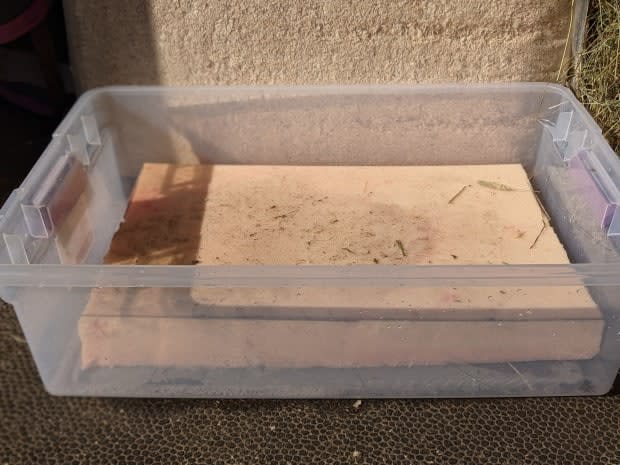P.E.I. horse owners on high alert amid potential spread of strangles

Horse owners, trainers and riders on P.E.I. are once again taking extra precautions to prevent the spread of strangles. The Island's last outbreak of the disease was in 2020-2021.
The upper-respiratory infectious disease is highly contagious and causes symptoms including swollen lymph nodes, fever and lethargy.
It's caused by the Streptococcus equi equi bacteria, and in some cases can cause swelling so extreme the lymph nodes cut off the horse's airway, leading to the common name "strangles."
"It's really strep throat of horses," said Dr. Ben Stoughton, a large animal internal medicine specialist and assistant professor at the Atlantic Veterinary College.
"Similar to what people get, they can get a strep infection in their throat."

Stoughton said the bacteria spreads "like wildfire" in barns, especially through nose-to-nose contact.
"If a horse is sharing water buckets or sharing grooming materials or in the same stall or the same vicinity and they're exposed to high levels of the bacteria, it is quite contagious," he said.
The veterinarian recommends that any horses showing symptoms be quickly isolated and tested for the disease.
"Preferably in a separate area or separate barn, separate tools, separate water, separate feed so that there's not any cross-contamination with people or things in the environment," he said.
"Then they start monitoring any of the other horses in the barn — checking their temperatures, seeing if they're having fevers."
6 horses with symptoms
Six horses were discovered to have symptoms that could indicate strangles at Charlottetown's Red Shores racetrack in late January and early February.
The general manager of Red Shores, David MacKenzie, said those horses were quickly taken off-site in accordance with the racetrack's policy.
"Thankfully the trainers were quite amenable and they removed the horses from the property here," he said.
While any illnesses technically wouldn't have to be reported to Red Shores until the horses are set to return to the track, MacKenzie said there are no confirmed cases of strangles at this time.

"We're watching very closely," he said.
Dr. Stoughton also said he hasn't treated any cases of strangles at AVC recently, but added that's not a surprise because most cases would be treated on-site by a local veterinarian and only brought to AVC if complications arise.
He said most horses, like humans, can fight off the illness on their own after two or three weeks, and medication can be given if the horse has a high fever.
Increased cleaning
In the meantime, Red Shores has also increased cleaning and biosecurity measures in its barns, particularly the ones where the horses showing symptoms had been staying.
"The biosecurity includes things like enhanced temperature checks on horses. We know that certain temperatures can be a symptom," MacKenzie explained.
"Foot baths so that people going in and out can clean off their boots and not take it from barn to barn. We sprayed disinfectant and in this case we took extra precautions and sprayed all the stalls where those horses were."
This isn't the first time Red Shores has buffed up cleaning measures. In November 2020 there was a confirmed case of strangles in a horse on the property. By March 2021, a second horse was infected and 200 horses had been tested for the disease.
"Strangles is an endemic disease so it's in the air — it's everywhere," said MacKenzie. "And we know it's a reality and we dealt with it a couple of years ago and we learned an awful lot from that."

MacKenzie said there are no plans to reduce the biosecurity measures anytime soon even though it's the off season. Staff are aware that strangles is "probably everywhere," so the key at this point is to monitor for it.
"Racing has ended right now but still the horses are training hard and we just want to keep them healthy," he said. "That's our first and foremost priority at Red Shores."
Dr. Stoughton said the outbreak a few years ago could actually help horses today.
"Many of them likely mounted a robust immune response to it and then they become more immune," he said.
"Three-quarters of those horses are going to be still immune now today."
Despite that, Stoughton said it's a good idea for all Island horse owners to keep an eye out for symptoms.
"In any place that you're going to find equids, you're going to find strangles. It's common around the world, and it shows up in different sporadic occasions where we find bursts of it in the population," he said.
"It has happened here before and it'll likely happen here again."


